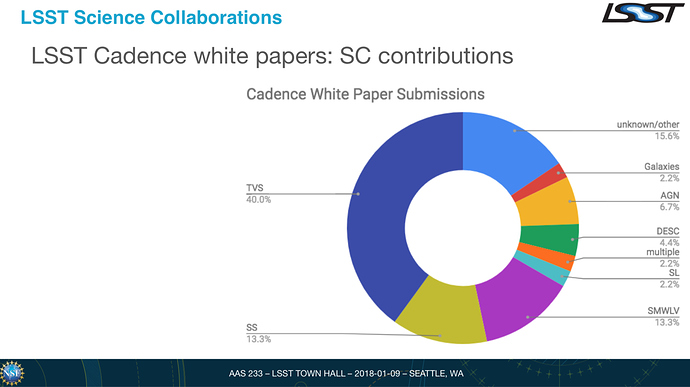A brief update of SSSC (Solar System Science Collaboration) happenings over the past month. A more detailed version will be sent out on the SSSC listserv.
Publications Policy - Thanks to those that sent feedback on the draft publication policy. The draft has been updated and we are asking for final feedback before a vote on adopting the publication policy is held in March.
SSSC Software Roadmap - With help and feedback from the Software Working Group, I’ve drafted a Software Roadmap in the same vein as our Science Roadmap. The document outlines what we think are the high priority software tasks that need to be developed by the community to maximize Solar System science with LSST. We plan to submit the document to AAS Research Notes in early March. We are currently asking for final feedback from the SSSC.
From Rachel Street of the Transients and Variable Stars Science Collaboration and Las Cumbres Observatory: I’d like to draw your attention to a powerful new software package available aimed at time domain observers, and an opportunity. The TOM Toolkit is designed to make it easy for astronomers to build Target and Observation Manager systems (e.g. NEO Exchange or the PTF Marshall) which can run large-scale follow-up observing programs. Functions typically include interacting with target brokers, observation planning and data visualization as well as directly submitting observation requests to a range of telescopes including LCO, SOAR and Gemini. We’re considering hosting a hackathon workshop to help observers get started, as part of preparations for ZTF and LSST. Travel support would be provided
LSST Cadence Optimization White Papers - All the white papers submitted in November the LST Cadence Optimization White Paper Call are available at https://www.lsst.org/submitted-whitepaper-2018 . The page includes links to the pdfs and abstracts. 13% of the white papers submitted were lead by a SSSC members; the 2nd largest contribution from a LSST Science Collaboration!
Image Credit: Federica Bianco
SBAG - Meg will be presenting this week at NASA’s Small Body Assessment Group Meeting about the SSSC’s activities. Further details and remote connection information [here](https://www.lpi.usra.edu/sbag/ and http://www.cvent.com/events/20th-nasa-small-bodies-assessment-group-meeting/event-summary-334ddb02c40f448dae580f1d1ae68d18.aspx) and here
LSST DPS Workshop Slides: Slides from the LSST and the Solar System Workshop at DPS are online: LSST Project & Solar System Data Status Update; LSST Solar System Science Collaboration (SSSC) Update; NOAO Data Lab Capabilities in Support of (LSST) Solar System Science; Gemini Solar System Follow-up in the LSST Era
LSST AAS Townhall - Presentations from the January AAS LSST Town Hall can be found here
LSST Science Collaborations Status + current activities - In October there was a presentation by the science collaborations on their current activities to the joint project science teams and science collaboration chairs. Slides can be found here. Video can be found here.
The Scheduler development progress and new Feature-based algorithm: Talk by Tiago Ribeiro & Lynne Jones to the LSST Project Science Team and Science Collaboration Co-chairs: Slides and Video are available.
The JPL Solar System Dynamics (including JPL Horizons) Announcement Listserv: Major changes are coming to the JPL Solar System Dynamics Services are coming in the near future, including possible hostname and/or URL changes. To be notified of such changes, instructions on how subscribe to their announcement listserv can be found at https://ssd.jpl.nasa.gov/?email_list
MPC Feedback - The PDS Small Bodies Node has convened a Minor Planet Center User Group (MUG) to represent the interests of the Minor Planet Center user community. T he MUG welcomes comments about the Minor Planet Center via this form
Big Ideas for Gemini Observatory in the Era of Multi-Messenger Astronomy and LSST Follow-up- Gemini Observatory has received a multi-million dollar award from NSF to advance our leadership in the era of Multi-Messenger Astronomy. The GEMMA program, funded by this award, is designed to maximize synergies with other transformative facilities coming online in the near future (like LSST) and will focus on the areas of high spatial resolution and rapid-response astronomy. We are seeking input from our user community with ideas for scientific studies enabled by these new capabilities. Please see the GEMMA web page to learn more and share your ideas and science requirements
AAS Research Notes Newsletter - Editor Chris Lintott is sending out a newsletter with links to recently published AAS Research Notes. You can sign up here.
Happy New Year
